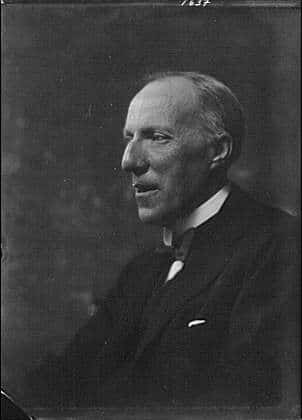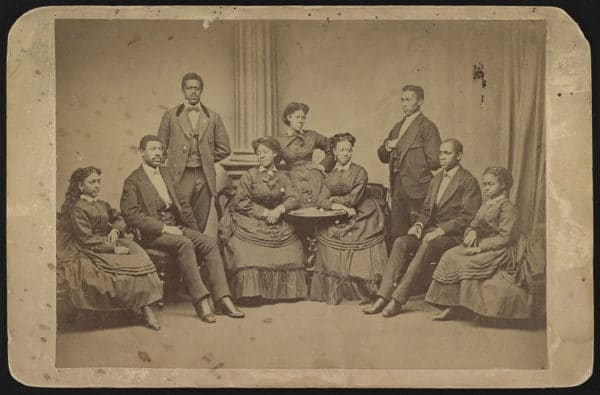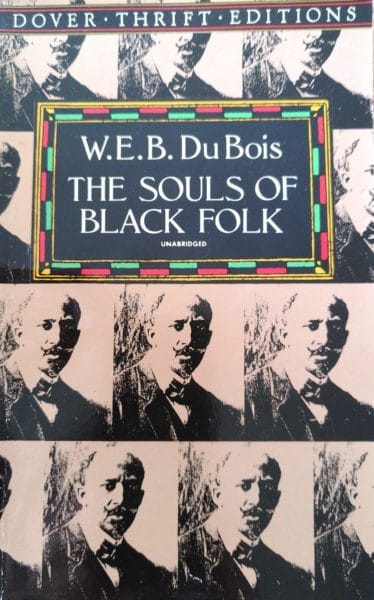It’s February 1903; the publisher A.C. McClurg & Co of Chicago writes to William Edward Burghardt Du Bois to ask him how the final chapter of his landmark work the Souls of Black Folk is progressing, entitled ‘The Sorrow Songs’.
 In Britain, a few months later, Cecil Sharp, a musician and music teacher, hears a folk song sung in Somerset, and embarks on a project to document British folk music for educational use and publication – the first time music of the common people has been captured and shared in this way.
In Britain, a few months later, Cecil Sharp, a musician and music teacher, hears a folk song sung in Somerset, and embarks on a project to document British folk music for educational use and publication – the first time music of the common people has been captured and shared in this way.
While Du Bois reproduced in print the inherited songs of black folk in his critical work, exploring race and civil rights – songs that had been performed in venues across Europe decades before by the Fisk Jubilee Singers – there is a void in the national inventory of folk music that Sharp began collating in 1903: the souls of black folk.
Cultural capital
Folk music is defined as a music that preserves the ancient traditions and culture of a nation, but rather than being created and curated by a powerful few, it originates from the many. It is a music that can speak to everyone and everything.
As DuBois put the finishing touches to The Souls of Black Folk in February 1903, In Dahomey – the first Broadway musical written by black writers and played by a black cast – premiered. By the summer of that year, the cast of In Dahomey were enjoying a successful run in London’s West End, after failing to continue the show in the US.
While In Dahomey had relative success on the London stage, it was not replicated by its black artists in other shows in London, and did not mark the start of an opening up of culture to everyone. Some of its success in 1903 is linked to the fascination its predominantly white audience had for the cakewalk, a popular part of blackface minstrel routines.
In Black and British: A Forgotten History, David Olusoga describes how minstrel routines – “a form of musical clownery” – were popular throughout the 19th century and into 20th century in Britain. Though their form and meaning for audiences are far from singular, minstrelsy was racist and utterly reductive. “The racial stereotyping, the exaggerated gestures, white faces with burnt cork in a grotesque act of racial impersonation – everything about blackface is profoundly unpalatable today,” writes Olusoga.
"I wanted to look at the folk archive to see if there are songs with black characters, characters of colour who are articulate, represented outside of the demeaning artistic form of blackface minstrelsy or as criminal or villain."
Sharp’s collection of folk music from around Britain – gathered through those early years of the 20th Century – form part of a folk music archive found at the Vaughn Williams Memorial Library. An archive the folk musician Angeline Morrison has been exploring as part of her project The Sorrow Songs: Folk Songs of Black British Experience.
Morrison’s project is rediscovering untold and forgotten stories of black people who lived in Britain throughout our history, to tell them through new songs in the sonic style of folk music.
“I wanted to look at the folk archive to see if there are songs with black characters, characters of colour who are articulate, represented outside of the demeaning artistic form of blackface minstrelsy or as criminal or villain,” she says. “What I did find was that black characters are in folk songs of the past but in the service of the narrative, rather than people with their own voice.”
To borrow a phrase from Du Bois, a black character in Britain’s folk canon is not a “co-worker in the kingdom of culture.”
Mirroring aspects of minstrelsy performance, which did explore the theme of abolition (see Olusoga’s account in Black and British), and social sentiment of the time, in the five days Morrison spent researching the archive, she found a similar number of abolitionist songs to songs with “frankly racist material.”

A weary heart
Black history and culture – despite stretching back throughout British history to the earliest Roman records – to this day, is often seen as separate to a nationwide, shared history and culture. Olusoga talks of the perpetuated notion that “black British history is exclusively a history of black settlement in Britain, rather than a global story of Britain’s interaction with Africans on three continents.”
In 1873, the legendary Fisk Jubilee Singers (from Nashville, Tennessee) introduced British audiences to the spirituals: “the articulate message of the slave to the world”, wrote Du Bois in The Souls of Black Folk.

The singers also introduced into the nation’s culture sounds that are instantly familiar to many but that few associate with Du Bois’ description: ‘Swing Low, Sweet Chariot’, ‘Nobody Knows the Trouble I See’ and ‘Deep River’. The slaves that created and shared these songs were taken from Africa on British boats, docked in British ports and worked on farms owned by British people.
“They are the music of an unhappy people, of the children of disappointment, they tell of death and suffering and unvoiced longing toward a truer world, of misty wanderings and hidden ways,” writes Du Bois.
In Black and British, Olusoga describes the spirituals sung by the Fisk singers – captured on gramophone recordings in the 20th century – as “powerfully sombre and radically original” compared to the popular “plodding music-hall routines and dated minstrel clichés popular throughout the era”.
Morrison, finding in her search of historic British folk music “nothing written in song that is equivalent to the spirituals, that embodies and articulates the experiences of black people”, is now composing a body of song that seeks to do just that, in the style of the spirituals and folk music.
“Folks songs are about ordinary people that come straight from the heart,” she says. “There is that common thread between one person and another through song. I hope these are songs that will be sung and, through that, they will gain some significance.”
Angeline Morrison performs Unknown African Boy (d.1830 Isles of Scilly) at Firelight in September 2021. Find a recently released demo of the song on her Bandcamp page.
Our story
Writing in the New York Review of Books at the turn of the new millennium in 2001, the historian Tony Judt described the “English capacity simultaneously to invoke and to deny the past – to feel genuine nostalgia for a fake heritage” as unique. “It amounts today, to a countrywide bowdlerization of memory,” he added.
In 2021, this bowdlerization (“to remove words or parts from a book, play, or film that are considered to be unsuitable or offensive” – Cambridge English Dictionary) is one of the key causes for the so-called culture wars that divide society. It goes some way to explain why the publicly available stories of black culture and people in Britain throughout our recorded history are largely unknown. Hidden in plain sight, these are the stories Morrison is putting into song.
“Song is more accessible for some people, a way of understanding; it can be the way people measure and experience the world. I have always gravitated towards song ever since I was a child,” she says.
“I was really interested in the importance of song for enslaved people and the importance of having a body of song which can express the deep grieving and sorrow of everyday people.
“Songs become so important as containers of experience and channels by which emotion can flow. What really struck me was that enslaved people and their ancestors in America had this body of song. For black people in Britain, we have no body of folk song that relates to our history, and experiences. They raise issues that are very much alive today.”
+
Angeline Morrison’s Sorrow Songs: Folk Songs of Black British Experience project is funded by Arts Council England, FEAST Cornwall and the English Folk Song & Dance Society.
Find her on Instagram and Twitter as @angelcakepie and Angeline Morrison Music on Facebook to find out more about upcoming performances and the latest on The Sorrow Songs project.
Listen to Morrison talk to Front Row on BBC Radio 4 about her research.
Image Credits:
Angeline Morrison, Firelight, September 2021, image: Hazel Beevers
Mr Cecil Sharp, portrait, photographer Arnold Genthe, Library of Congress, Prints & Photographs Division, Arnold Genthe Collection, LC-G432-1637 (b&w glass neg.) LC-DIG-agc-7a15299 (digital file from original neg.)
Jubilee singers, Fisk University, Nashville, Tennessee, photographer James Wallace Black, 1872, Library of Congress, Prints & Photographs Division, LC-DIG-ppmsca-39589 (digital file from original photo)
The Souls of Black Folk, W.E.B Du Bois (Dover Publications, 1994)